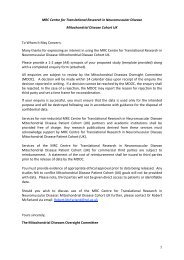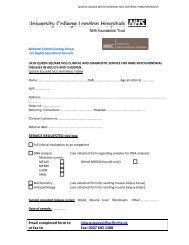user manual - The Rare Mitochondrial Disease Service for Adults ...
user manual - The Rare Mitochondrial Disease Service for Adults ...
user manual - The Rare Mitochondrial Disease Service for Adults ...
Create successful ePaper yourself
Turn your PDF publications into a flip-book with our unique Google optimized e-Paper software.
NEWCASTLE MITOCHONDRIAL NCG DIAGNOSTIC LABORATORY<br />
<strong>Rare</strong> <strong>Mitochondrial</strong> Disorders <strong>Service</strong> <strong>for</strong> <strong>Adults</strong> and Children<br />
MUTATION/DISORDER TO BE TESTED TYPE OF TEST/ SAMPLE NEEDED<br />
SLC25A4 (ANT1) Sequencing of the entire SLC25A4<br />
Patients with dominant PEO and coding region. Blood DNA samples<br />
multiple mtDNA deletions appropriate and required.<br />
POLG2 Sequencing of the entire POLG2<br />
Patients with dominant PEO and coding region. Blood DNA samples<br />
multiple mtDNA deletions appropriate and required.<br />
RRM2B Sequencing of the entire RRM2B coding<br />
Patients with dominant/recessive PEO and region. Blood DNA samples appropriate<br />
multiple mtDNA deletions and required .<br />
TK2 and RRM2B Sequencing of the entire TK2 and<br />
Patients with evidence of mtDNA depletion RRM2B coding regions. Blood DNA<br />
in skeletal muscle samples appropriate and required.<br />
DGUOK and MPV17 Sequencing of the entire DGUOK and<br />
Patients with evidence of mtDNA depletion MPV17 coding regions. Blood DNA<br />
in liver samples appropriate and required.<br />
SUCLA2 and SUCLG1 Sequencing of the entire SUCLA2 and<br />
Patients with evidence of mtDNA depletion SUCLG1 coding regions. Blood DNA<br />
and methylmalonic aciduria samples appropriate and required.<br />
TRMU Sequencing of the entire TRMU<br />
Patients with evidence of acute liver disease coding region. Blood DNA<br />
and respiratory chain deficiency samples appropriate and required.<br />
Nuclear complex I structural genes Sequencing of the entire coding region<br />
A panel of 9 genes can be screened in patients of nine structural genes. Blood DNA<br />
with isolated complex I deficiency samples appropriate and required.<br />
(NDUFV1, NDUFV2, NDUFS1, NDUFS2,<br />
NDUFS3, NDUFS4, NDUFS7, NDUFS8, NDUFAB1)<br />
Complex II structural and assembly genes Sequencing of the entire coding regions.<br />
Patients with evidence of isolated complex II Blood DNA samples appropriate and<br />
deficiency. Sequencing of the four structural required.<br />
genes (SDHA, SDHB, SDHC, SDHD) and a<br />
known assembly factor (SDHAF1)<br />
Nuclear complex III genes Sequencing of the entire coding region.<br />
Patients with isolated complex III deficiency Blood DNA samples appropriate and<br />
are screened <strong>for</strong> mutations in the BCS1L gene, required.<br />
a known complex III assembly factor<br />
CVB and prenatal testing <strong>for</strong> nuclear and Please contact Professor Taylor to<br />
mtDNA mutations discuss individual cases<br />
Page 8 of 10 Date of original issue: March 2007<br />
Revised version June 2011




